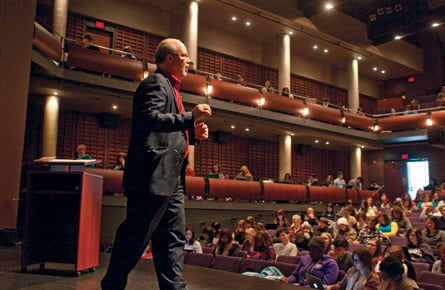Professors: more than “guides on the side”
Pettigrew tells would-be reformers to knock it off
Share

Follow the news and commentary around teaching in higher education these days are you will soon come across the little rhyme in the middle of this passage by Robert Mendenhall:
When faculty serve as lecturers, holding scheduled classes for a prescribed number of weeks, the instruction takes place at the lecturers’ pace. For most students, this will be the wrong pace. Some will need to go more slowly; others will be able to move much faster. Competency-based learning shifts the role of the faculty from that of “a sage on the stage” to a “guide on the side.” Faculty members work with students, guiding learning, answering questions, leading discussions, and helping students synthesize and apply knowledge.
One sees this little gem everywhere. The “sage on the stage” is the bad old way; “guide on the side” is where it’s at! It is trotted out over and over again by those who fancy themselves innovators in education. They need to knock it off.
There are plenty of reasons to be suspicious of this clichéd couplet. For one, there is a certain naive smugness in the way it is presented: it must be true: it rhymes! And, as I have argued in this space before, it is just about impossible to provide useful advice in anything like a universal form. Teaching situations are just too different.
A more important reason to distrust the sage/stage/guide/side formulation is that it presupposes an unrealistic student body, even at university. Sure, if all or even most of your students were impeccably prepared, exceedingly diligent, and wonderfully intelligent, university teachers could indeed relax and guide-on-the-side to their hearts content.
Sadly, this scenario rarely reflects, as the military types say, the situation on the ground. Students coming to university from high school know, for purposes of scholarship, approximately nothing, and so it is virtually impossible to teach effective introductory courses in the manner that side-guiders would like.
Further, many students come to class without having done the necessary readings and other preparation, and so have little to contribute in class. You simply can’t lead a discussion about a novel with a group of students who have not read it and who scarcely know what to make of it if they have read it.
Instead, you have to start by modelling for them what an intellectually sophisticated methodology looks like. This kind of presentation requires a great deal of patience, knowledge, and intelligence. And it helps if the students can see and hear you. Sage, meet stage.
Worst of all, the snide attacks on sages atop stages has a core of ugly anti-intellectualism. The “sage” part is meant to suggest that professors are presumptuous buffoons, pretending to perch high on some inaccessible mountain of knowledge. The “stage” part presents us as preening egoists, in love with the sounds of our own voices. Meanwhile, the guides on the sides sit in glorious modesty, actually (in their view) helping the students. But professors are professors not because we are inherently superior beings, but because we have cultivated expertise in our fields over many years. We betray our students if we pretend otherwise and don’t give them every benefit of our sagacity.
Of course, as students progress in skill and knowledge, they need less direct instruction. They take a more active role in their own education and they increasingly are ready to be guided. But this transition is gradual and will vary depending on the student and the material at hand. A first-year student needs plenty of direct instruction to help him find his feet. A fourth-year honours student is better positioned to make use of a knowledgable guide. And it’s mean spirited to pretend that those of us who see such nuances are merely old-fashioned narcissists.
In short, faculty members must be malleable to be valuable: dogmatic is not pragmatic.
Todd Pettigrew teaches English at Cape Breton University.